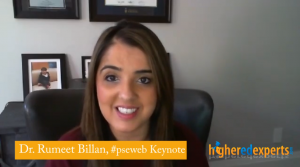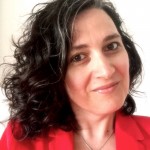Let’s talk about psychological capital and resilience!
As I explained in my post about the long-lasting love story between Higher Ed Experts and higher ed conference keynotes, we’re sponsoring this year the opening keynote at the Canadian #PSEWEB Conference in London, Ontario. I’ve chosen this specific keynote, because it is a great fit with Higher Ed Experts’ mission (helping you learn and grow in your higher ed career) and values.
I had the privilege to interview Dr. Rumeet Billan, a Learning Architect and the President of Viewpoint Leadership, to talk about her keynote, psychological capital, resilience and unconscious bias in higher education. And, I really can’t wait to attend her keynote on August 13, 2018.
Wondering what pyschological capital is all about?
According to Dr. Billan, this is quite a new concept that focuses on the individual and the ability to build self-confidence and self-trust. The crux of her entire keynote will be based on resilience.
Today, it’s impossible to ignore the impact our connected devices have on our well-being and mental health, so I was curious to get Rumeet’s take on the topic to start this interview.
Rumeet, your audience at PSEWeb will be composed of higher ed digital professionals either working on the web or social media, all very big users of technology and screens for work. Do you think that the use of screen has an impact on our ability to be resilient and our well-being?
We’re seeing a lot of data come out related to social media, the web and being on the computer and the impact on mental health and well-being.
Looking at how an individual perceives things like social media posts, how they’re interpreting them, how they’re connecting that back to their identity and what they feel about themselves, it’s obvious there’s a huge connection between our well-being and technology use.
There’s a connection with stress, how we manage stress, how we relate to stress and how many times per day we’re distracted because something goes “ping” or we have a notification.
All of these things have an impact on our psychological capital.
Universities and colleges have relied a lot on social media channels to communicate, reach out and engage students. Is it to say that they might have done students a disservice by doing so? Is a there a balance higher ed professionals should strive for?
That’s an excellent question. There’s a balance and I think higher education institutions have been using it from the perspective of getting information out.
We do need to be careful of how people are internalizing what universities put out. For example, if an individual doesn’t get admitted or hired and the institution is congratulating publically people that do, that might impact this individual in a negative way.
It’s important to be mindful that everyone has access to social media and they can see what it is that you’re posting and the messages you’re sending out.
You won’t talk about unconscious bias at the conference, but you’ve done research and many talks about it. Can you explain us what it is about?
 Absolutely unconscious bias has become such a popular topic in relation with diversity and inclusion.
Absolutely unconscious bias has become such a popular topic in relation with diversity and inclusion.
We all have biases. It’s not a bad thing per say, because we were wired to be biased. It protects us: we can assess situations, whether or not they are threats.
But, where we need to be careful is when these biases actually impact the decisions we’re making, when it’s impacting larger groups and whether or not we’re excluding certain groups because of how we communicate and what we post.
So, when we think about unconscious bias – more implicit bias, it’s those biases we’re not aware of.
The goal is to start and continue to challenge our assumptions.
So, when we’re putting out a piece of communication, we can just ask: “Am I saying what I intend to say?”, but also: “Will different groups interpret this differently?” or “Am I excluding certain groups based on what it is that I’m communicating and could I use better language or a better graphic or whatever it might be to avoid this?”
It’s all about challenging our assumptions. That’s how we can make unconscious biases actually conscious.
Do you think that higher education displays more unconscious bias than other industries do?
I think it’s consistent across the board, but what I will say is that higher ed institutions are doing a lot of great things to deal with the issue.
For example, one institution in the Greater Toronto Area has implemented unconscious bias training for their staff.
They’ve introduced anonymized recruitment as a part of their Human Resources processes and looked at how it impacts those that are being invited for interviews and selection.
So, I think higher education is beginning to do a lot of great things around this area and it should, because that’s where we learn from. It’s positive, but there is still a lot of work to be done in the higher ed space.
Meet the Faculty: Karine Joly
Higher Ed Experts is a professional online school for digital professionals working in universities and colleges.
When you take a professional certificate course with us, you get a chance to upgrade your skills by working on your projects, interacting with classmates just like you and getting detailed personalized feedback from your instructor.
 Karine Joly founded Higher Ed Experts in April 2007 and teaches Higher Ed Expert’s 8-week online course on Social Media Marketing for Higher Education.
Karine Joly founded Higher Ed Experts in April 2007 and teaches Higher Ed Expert’s 8-week online course on Social Media Marketing for Higher Education.
She oversee the development of the professional development curriculum for the school. She shares her insights about emerging web and social media trends on collegewebeditor.com, a popular and independent blog launched in February 2005. She also authors the Internet Technologies column for University Business. Karine has presented on social media marketing, web analytics and online courses at leading higher ed conferences (CASE, American Marketing Association, EduComm, eduWeb, CUPRAP, HighEdWeb, PSEweb, UB Tech, etc.).
Tags: Higher Ed Experts Faculty, Higher Ed News, Karine Joly